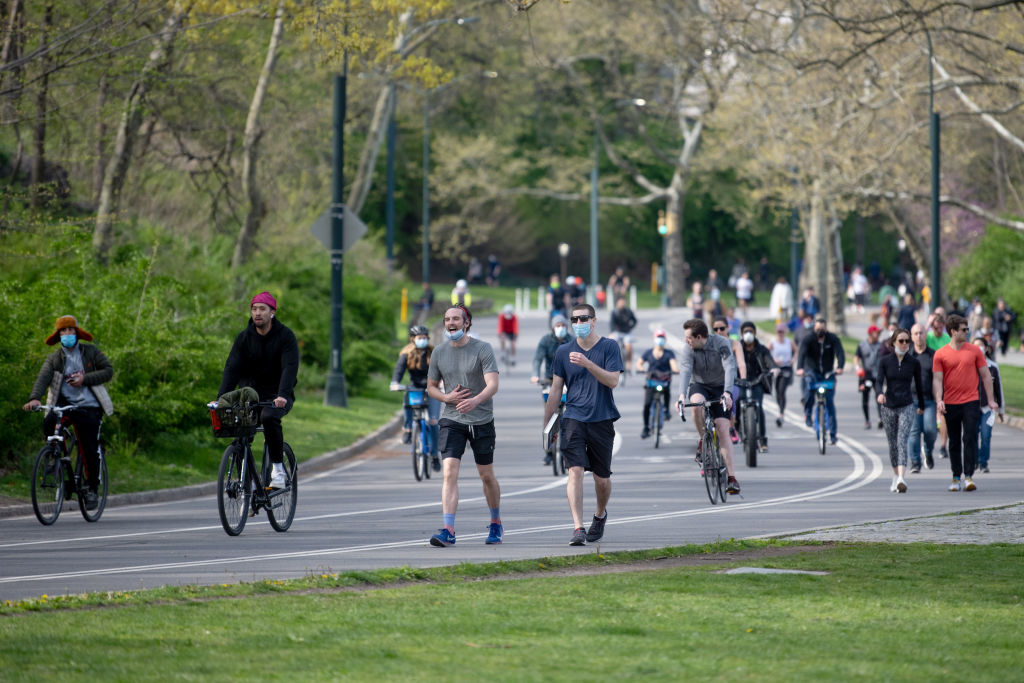
As lockdowns drag on and on in many U.S. states, there are worrying signs that people’s resolve to continue social distancing is flagging.
An illicit house party in Chicago made headlines this week, as did photos of crowded beaches in Southern California and packed parks in New York City. Anonymized cell-phone data tracked by the University of Maryland also shows more and more people are making non-work-related trips outside as quarantines drag on, and a TIME data analysis found that some states are experiencing new surges in coronavirus cases after initial declines.
Jacqueline Gollan, an associate professor of psychiatry and behavioral sciences at the Northwestern University Feinberg School of Medicine, has coined a name for this phenomenon based on her 15 years of research into depression, anxiety and decision-making: “caution fatigue.”
Gollan likens social-distancing motivation to a battery. When lockdowns were first announced, many people were charged with energy and desire to flatten the curve. Now, many weeks in, the prolonged cocktail of stress, anxiety, isolation and disrupted routines has left many people feeling drained. As motivation dips, people are growing more lax about social-distancing guidelines—and potentially putting themselves and others in harm’s way, Gollan says.
Even as some states begin the process of reopening, it’s crucial that people continue to follow local social-distancing guidelines to avoid back-sliding. To help, use Gollan’s tips for fighting caution fatigue.
Take care of your physical and mental health
You’ve heard all these tips before, but they bear repeating: get enough sleep, follow a balanced diet, exercise regularly, don’t drink too much, stay socially connected and find ways to relieve stress. “If people can address the reasons for the caution fatigue, the caution fatigue itself will improve,” Gollan says.
Gollan also says it’s important to improve your “emotional fitness.” She recommends expressing gratitude, either to others or yourself; setting goals for how you want to feel or act; and taking time just to decompress and laugh.
Reframe risks and benefits
As important as they are, goals like flattening the curve and improving public health can be hard to stay fired up about since they’re somewhat abstract, Gollan acknowledges. So it can be useful to think about how your behavior directly affects your chances of getting sick, and thus your chances of spreading the virus to people around you.
People tend to overvalue what’s already happened, assuming if they haven’t gotten sick yet they won’t in the future. “But if your behavior changes and you have a gradual decline in your safety behaviors, then the risk may increase over time,” Gollan says. Remembering that reality can prevent you from falling into “thinking traps” like convincing yourself another trip to the grocery store is absolutely necessary, when it’s really just out of boredom, Gollan says.
Rebuild your routine
Coronavirus has probably shattered your regular daily routine—but you can still make time for things you valued before the pandemic, like exercise and socializing. Creating a new normal, to the extent possible, can be stabilizing, Gollan says.
Focusing on small pieces of your new routine can also be a helpful way to grapple with uncertainty. If it’s hard for you to think about how long quarantine may stretch on, instead focus on the immediate future. “What are you going to do this morning?” Gollan says. “Are there things you’re not doing that you should?”
Make altruism a habit
It may help to remember that social-distancing is really about the common good. In keeping yourself safe, you’re also improving public health, ensuring that hospitals can meet demand and quite possibly saving lives. “There’s something powerful about hope, compassion, caring for others, altruism,” Gollan says. “Those values can help people battle caution fatigue.”
Just like anything, selfless behavior gets easier the more you do it, Gollan says. “Try small chunks of it,” she suggests. “What can you do in the next hour, or today, that’s going to be a selfless act to others?” Donating to charity or checking in on a loved one are easy places to start.
Switch up your media diet
Just as you may learn to tune out the sounds outside your window, “we get desensitized to the warnings [about coronavirus],” Gollan says. “That’s the brain adjusting normally to stimulation.” Even something as simple as checking a credible news source you don’t usually follow, or catching up on headlines from another part of the country, could help your brain reset, she says.
More Must-Reads from TIME
- Why Biden Dropped Out
- Ukraine’s Plan to Survive Trump
- The Rise of a New Kind of Parenting Guru
- The Chaos and Commotion of the RNC in Photos
- Why We All Have a Stake in Twisters’ Success
- 8 Eating Habits That Actually Improve Your Sleep
- Welcome to the Noah Lyles Olympics
- Get Our Paris Olympics Newsletter in Your Inbox
Write to Jamie Ducharme at jamie.ducharme@time.com